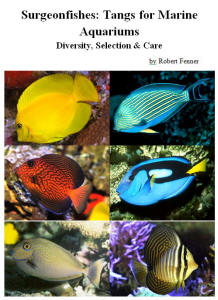|
FAQs about the Yellow-Tail Blue, Palette,
Hippo Tang Identification
Related Articles: The
Genus Paracanthurus,
Related FAQs: Pacific
YTB Tang FAQs 1, Pacific
YTB Tang FAQs 2, Pacific YTB Tang
FAQs 3, Pacific YTB Tang FAQs
4, PYTB Tang Behavior,
PYTB Tang Compatibility, PYTB Tang Selection, PYTB Tang Systems, PYTB Tang Feeding, PYTB Tang Disease, PYTB Tang Reproduction, Surgeons In General, Tang
ID, Selection,
Tang
Behavior, Compatibility, Systems, Feeding, Disease,
|
|
Surgeonfishes: Tangs for Marine Aquariums
Diversity, Selection & Care
New eBook on Amazon: Available here
New Print Book on Create Space: Available
here
by Robert (Bob) Fenner |
 |
"Black" Paracanthurus hepatus
5/2/07 Dear Bob Fenner, I am doing a research on Paracanthurus
hepatus as an aquarist for my book. I have been following the aquarium
forums for years and once in a blue moon I see people post photographs
of P. hepatus with either totally black coloring or just half black
(not the regular coloration). It has been told that these
"black" hippo tangs are from Hawaii <No Paracanthurus
there> but since hippo tangs do not live in Hawaii I believe they
are from Japanese according to my research. <Occasionally occur from
S. Japan, and elsewhere...> I wanted to hear your opinions about
this rare colored tang. I am adding a photo I found from the Reef
Central forum. There are a couple more from different people with even
"totally" black Paracanthurus tangs. Sincerely, Selim ?adar
<Perhaps a bit of "genetic drift" here... Will this (at
this time, these places...) prove to be of adaptive/survival value? Bob
Fenner>
Re: "Black" Paracanthurus hepatus - 05/02/07
So you say this is not a regional color morph but a genetic drift.
<This is only a guess... I don't think this is a matter of
"disease" as in melanization associated with a tumour,
nervous damage... I am surmising here that the dark coloration confers
some sort of advantage... avoidance of predators?> My guess was more
on the regional part but I think you are right. Thanks <These two
ideas are not mutually exclusive... It stands to "reason"
that such occurrence would be clustered geographically... An
interesting hypothesis that I think you and I should do extensive
"sampling" (dive traveling) to investigate, eh? BobF>
Regal Blue Tang with Red Dorsal Fin... ID. -
08/05/06 I have been trying to figure out the deal with these Blue
Tangs that have red on their dorsal and pectoral fins. <Geographic
variation w/in the species... some even "skip and bow" more
in their behavior from different island groups...> I
know that there are regular Blue Tangs and yellow-belly Blue Tangs that
develop the yellow-bellies as they mature. <Same species...>
Is there a difference in species between all of these
different types of blue tangs (Hippo Blue/Regal Tang, Yellow-belly
Blue/Regal Tang and Blue/Regal Tang with the red fins)? <Nope...
though I will say the "colored ones" seem to be by and large
far superior in terms of outright hardiness, adaptability to captive
conditions, acceptance of non-wild foods> Are they all
supposed to develop the red fins and only some do, or what?
Thanks, Krissi <Mmm, once again
a matter of where they come from... Like more (real) blondes in
Scandinavian countries... Bob Fenner>
Re: Regal Blue Tang with Red Dorsal Fin
8/6/06 Thanks! I have two more questions about this,
though: 1) Are the colored ones colorful from a
juvenile state or do they develop color as they mature, and <A bit
of both. Are lighter colored in the lower flank and more colorful in
the pectoral fins as juveniles... and become more so with
age/growth> 2) How can I get a colorful one? <Look
for, order from a dealer... from Christmas Island, Guam... sometimes
Micronesian suppliers/origins> Should I look for colorful adults or
juveniles? <See WWM re best size to start...> Buy Tang from a
certain region? Are there stores or breeders that actually
carry them? <Yes, seasonally. Quality Marine (who
sells to a few outfits) has these quite often. Do generally sell at a
premium to other sources... but worth it> Thanks
again! You guys have saved my tush more than once!
Krissi <Perhaps a re-read through WWM re
Paracanthurus... Bob Fenner>
Surgeonfishes: Tangs for Marine Aquariums
Diversity, Selection & Care
New eBook on Amazon: Available here
New Print Book on Create Space: Available
here
by Robert (Bob) Fenner |
 |

